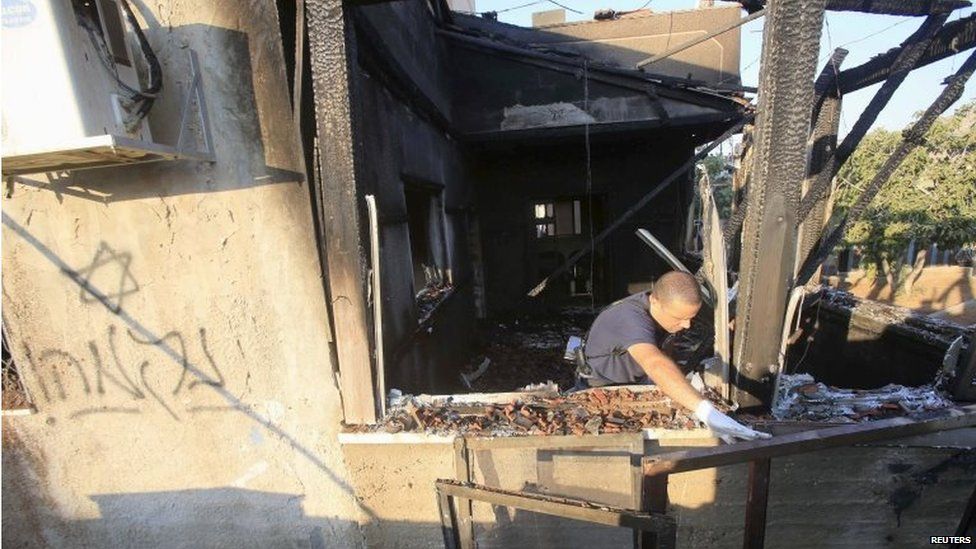Israel Jewish militants 'face harsh interrogation methods'
- Published

Israel says it could use harsh interrogation methods to tackle violent Jewish extremism, after the death of a Palestinian infant in an arson attack.
Interior Security Minister Gilad Erdan told Israel Radio that suspected Jewish extremists may be shaken violently in custody - a controversial treatment used on Palestinian suspects.
Israel earlier said Jewish extremists may also be detained without trial.
Palestinian officials have blamed Israeli policy for the child's death.
Eighteen-month-old Ali Saad Dawabsha was killed when his home in the West Bank village of Duma was fire-bombed last week.
The child's parents and four-year-old brother were seriously injured in the attack, suspected to have been carried out by Jewish settlers.
Meanwhile a prominent settler activist has been arrested for alleged involvement in an extremist group, Israel's domestic security agency Shin Bet has said.
Meir Ettinger is grandson of Meir Kahane, a rabbi who founded the anti-Arab movement Kach. Mr Ettinger is suspected of links to an arson attack on a shrine in northern Israel in June, Israeli media reported.
'Any method kosher'
The Interior Security Minister said on Monday that an Israeli security cabinet meeting had authorised the security services to interrogate suspected Jewish militants by violent shaking. He referred to the technique using the Hebrew word "tiltul".
"What the security cabinet told the security services was that any method is kosher," Mr Erdan told Israel Radio, in comments quoted by the Reuters news agency.
"An interrogation method like tiltul, or anything that is done when it comes to Palestinian terrorists - the same thing should be done when it comes to a Jewish terrorist."
According to Reuters, the use of tiltul was restricted by Israel's supreme court in 1999. However, the practice is still said to be permitted in cases where an interrogator can prove that they need information to prevent imminent attacks.
The minister's comments were criticised by Itamar Ben-Gvir, a lawyer who has represented far-right Israelis accused of political violence.
"The government is acting like an elephant in a china shop," he told Reuters news agency. "After they've spared arch-terrorists this method, they want to try it out against Jewish youths."
What are 'price tag' attacks?
- The name given to certain types of attack by militant Jewish settlers and their supporters in the West Bank and Israel
- Such attacks commonly involve graffiti including the words "price tag", vandalism, arson and destruction of Palestinian olive trees
- Carried out as a form of retribution for Israeli government curbs on settlement activity and for attacks by Palestinians
Israeli Prime Minister Benjamin Netanyahu has described the Duma attack as "an act of terrorism in every respect". He said every effort was being made to capture those responsible.
However, the Palestine Liberation Organisation (PLO), which dominates the Palestinian Authority in the West Bank, said it held the Israeli government "fully responsible for the brutal assassination".
"This is a direct consequence of decades of impunity given by the Israeli government to settler terrorism," it said.
No arrests have been made over the attack so far. Slogans in Hebrew, including the word "revenge", were found sprayed on a wall of one of two fire-bombed houses.
While it is unclear what the word "revenge" referred to, the incident resembles what have become known as "price tag" attacks.
Such attacks usually involve acts of vandalism or arson by Jewish extremists as retribution for actions taken by the Israeli government against Jewish settlements or unauthorised outposts in the West Bank, or for violence by Palestinians.